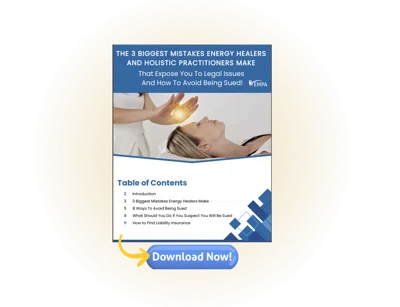Marketing and Risk: What Every Energy Healer Needs to Know
September 23rd, 2025
4 min read
By Anya Charles

In the world of energy healing, marketing often begins as simple conversation — describing a service, sharing an experience, or highlighting what a client has said. Yet once those words are placed on a website, brochure, or social media post, they become part of the public record.
It’s common for practitioners to be surprised by how closely advertising laws and scope of practice rules apply to their work.
Statements that seem harmless in everyday conversation — or even in a client testimonial — can sometimes be interpreted as a promise of results or as stepping into the territory of practicing medicine without a license. (Not good!)
At the same time, marketing is a vital way to connect with clients and share the value of this work. The good news is that there are safe, authentic ways to do both.
By understanding the language that carries risk and the alternatives that communicate clearly, practitioners can protect their practice while still expressing what makes their work meaningful.
 When Everyday Language Becomes Risky
When Everyday Language Becomes Risky
Phrases that feel natural in conversation can take on new weight when placed in marketing materials. A simple line like “This work heals anxiety” or “My sessions cure stress headaches” may seem encouraging, but once written on a website, flyer, or social post, it can be interpreted as a medical claim.
The distinction comes down to the difference between subjective language and objective claims.
- Objective claims make specific promises, such as stating that a method “treats back pain” or “eliminates insomnia.” These require scientific evidence recognized by regulators.
- Subjective statements focus on experience, such as “clients may report feeling more relaxed, calmer, or lighter.” These are personal, non-measurable outcomes that reflect client perspective rather than medical results.
This distinction matters because advertising laws — enforced by the Federal Trade Commission (FTC) and state agencies — apply to all public marketing. Even an honest testimonial can become risky if it implies a guaranteed outcome.
What begins as word-of-mouth can quickly shift into word-of-law when shared publicly. Recognizing that shift is the first step toward marketing that is safe, clear, and authentic.
.png?width=26&height=23&name=Marketing%20and%20Risk%20What%20Every%20Energy%20Healer%20Needs%20to%20Know%20(1).png) Scope of Practice and Language Boundaries
Scope of Practice and Language Boundaries
One of the most common risks in marketing for energy practitioners comes from crossing into territory reserved for licensed healthcare providers.
Words like treat, cure, diagnose, prevent, or heal may seem harmless, but in the eyes of regulators they imply medical authority. Using them without the proper license can lead to accusations of practicing medicine without a license.
Language boundaries also apply to titles and credentials. Terms like “doctor,” “therapist,” or “counselor” are protected by licensure in most states, and should only be used if you hold those qualifications. More flexible identifiers such as “practitioner,” “facilitator,” or “guide” communicate professionalism without stepping into restricted ground.
💡For more detailed guidance on language do’s and don’ts, see EMPA’s article: What You Can and Can’t Say in Your Marketing as an Energy Practitioner.
By aligning your language with your scope of practice, you reduce the risk of misunderstanding while presenting yourself as both authentic and professional.
 Why Marketing Can Create Liability Risk for Healers
Why Marketing Can Create Liability Risk for Healers
It’s easy to think of marketing as light and secondary — an afterthought compared to the work done in session. In reality, every public description of your services is treated as part of your professional conduct. Websites, social media, and even casual directory listings are viewed no differently than more formal advertising.
What many practitioners may not realize is how broad accountability can be.
Oversight doesn’t come only from regulators. Anyone who sees your materials can raise a concern — a client, a family member, another practitioner, or even someone who misunderstands your words.
Consider this example: a Healing Touch apprentice posted about her services on a local listing site. Because she hadn’t clearly explained her apprentice status, her post was flagged by the state massage board, and she faced a potential fine of several thousand dollars before the confusion was cleared up.
The lesson is that marketing is never “just marketing.” Every phrase and description lives in a public space where it may be reviewed, challenged, or misinterpreted.
Recognizing this reality allows practitioners to treat communication with the same care they give to their sessions.
💡Want to go deeper? Read our article: How to Protect Yourself From Being Sued as an Energy Practitioner. It explores the core documents we believe every practitioner should have on file — a client agreement, scope of practice, and code of ethics — and why they’re essential to protecting your reputation and your practice.
Marketing Missteps That Create Risk
Beyond language itself, there are other aspects of marketing that can unintentionally create exposure for practitioners. These often show up not through intent to mislead, but through small oversights that accumulate over time.
A few examples include:
- Testimonials without context. Even glowing feedback can become problematic if it suggests promised results. Always get written permission, and frame reviews around personal experience rather than outcomes.
- Missing disclaimers. A simple disclaimer on your website, brochures, and social media clarifies your role and level of training. Without it, readers may assume your work falls under licensed medical or mental health care.
- Outdated materials. Old flyers, blog posts, website text, or social content may use language you’ve since updated. If it’s still searchable, it’s still part of your public record.
Many of the issues that land practitioners in trouble stem from a handful of avoidable oversights. That’s why we created the 3 Biggest Mistakes guide — to help energy healers spot hidden risks in their practice and fix them before they escalate.
Each of these missteps is preventable with regular review and a commitment to clear, consistent communication.
 Best Practices for Safer Marketing in Energy Medicine
Best Practices for Safer Marketing in Energy Medicine
Safe marketing doesn’t have to dilute your message. It can be a way to share your work in language that is clear, authentic, and aligned with professional standards. Many practitioners find the following practices useful:
- Review materials regularly. A periodic review helps keep everything consistent and up to date.
- Use client-centered phrasing. Many healers prefer to highlight what clients have reported noticing in their own experience.
- Ask for written permission on testimonials. Even when feedback is positive, having signed consent — especially if names or photos are used — creates an extra layer of professionalism.
- Include disclaimers consistently. Simple statements about training, education, and scope of practice are a straightforward way to set expectations across websites, emails, and printed materials.
What’s Next: Safe Marketing for Your Practice
In the past, many energy practitioners have been surprised to learn that even casual marketing language can create risk if it sounds like a promise or crosses professional boundaries.
However, there are practical ways to reduce that exposure. Using client-centered phrasing, keeping disclaimers up to date, and aligning all materials with a clear scope of practice are simple steps that bring both clarity and professionalism to communication.
Here at EMPA, we continue to support practitioners with educational resources, community guidance, and liability insurance tailored for the energy medicine field. If you’d like to see the most common oversights that put practices at risk, our 3 Biggest Mistakes guide is the best place to begin!
When marketing reflects both authenticity and compliance, it strengthens your reputation and your protection.
Disclaimer: This article is for educational purposes only and does not provide legal, financial, or medical advice. The examples are general, and coverage may vary by policy. Always refer to your insurance provider or policy language for specific details, as the policy terms take precedence. For legal concerns related to your practice, consult an attorney.
Anya is a writer with a passion for inspiring those around her. She is the Content Manager at EMPA, where she works closely with subject matter experts to turn their insight into articles that inform, support, and empower the energy healing community. With over a decade of experience in the wellness world, she enjoys making complex ideas feel accessible and meaningful. Whether she’s writing new pieces or polishing others, Anya’s focus is on helping others grow their clarity and professionalism. She also serves as Editor in Chief of Energy Magazine, a unique publication dedicated to the world of energy medicine. Outside the office, you’ll find Anya reading, planning travel adventures, or negotiating peace treaties with her houseplants.
Topics:

.png?width=1326&height=405&name=EMPALogo_final_white-01%20(1).png)


























